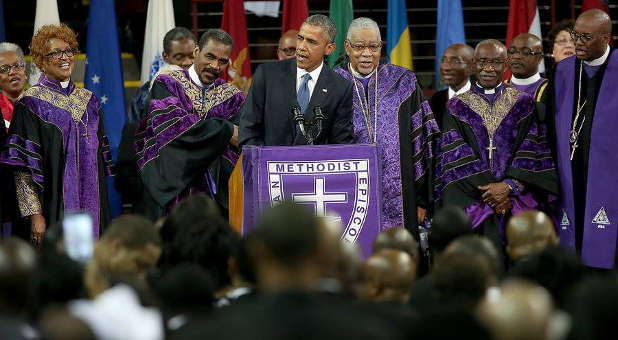What’s Behind Obama’s Hyper-Focus on God’s Grace?
Following President Obama’s eulogy of Pastor Clementa Pinckney, one of the victims of the June 17 massacre at Charleston’s Emanuel AME Church, the faith of our so-called “comforter-in-chief” is back in the spotlight.
Dr. Gary Scott Smith, professor and chair of the history department at Grove City College, penned an editorial piece looking at the president’s faith, including his focus on grace when Obama has spoken to audiences in mourning.
“Despite his repeated testimony to his Christian faith … many Americans either profess confusion about his religious convictions or consider them to be irrelevant,” Smith writes. “It is well-known that numerous polls, especially during his first term, report that only half of Americans consider him to be a Christian.
“Undoubtedly speaking for many, James Fallow asserted recently in the Atlantic Monthly, ‘If asked to describe Obama,’ he would probably use many other adjectives before he employed ‘religious’ or ‘Christian.'” The president is “much more likely to explain his views” by referring to history, literature, economics or jurisprudence “than to the teachings of his faith.”
Though his faith often seems to take a backseat to other considerations, Obama does have a history of trying to use faith-based language to support his policies, even ones at odds with much of the faith community.
“[Obama has] frequently employed religious rhetoric and scriptural phrases (most notably ‘my brother’s keeper’ [the name of a minority youth program the president’s administration launched last year]) to promote many other policies, including ones pertaining to poverty, immigration, the environment and gay marriage,” Smith writes.
While Obama’s faith-based rhetoric may get aired more than his faith itself, when he does speak about faith, it often focuses on grace. And during his eulogy of Pinckney, a speech that was itself criticized by some for politicizing the tragedy to push the president’s policies, his faith focus on grace was out in full force.
“Obama’s central theme, however, was grace,” Smith writes. “He lauded Pinckney for understanding ‘the power of God’s grace’ and emphasized that Christianity taught that God’s ‘grace is not earned. Grace is not merited. It’s not something we deserve. Rather, grace is the free and benevolent favor of God.'”
Smith points out a pattern in Obama’s oratorical history in office, from national events, Easter and Christmas messages, eulogies and more. For many of his key speeches in office, when faith comes up, it’s often grace at the forefront.
“Obama’s primary focus … has been on God’s grace in forgiving people’s sins and deficiencies,” Smith writes. “At the 2012 National Prayer Breakfast, Obama shared that as he reflected on through a “period of doubt and confusion” and finding “Christ when I wasn’t even looking for Him,” he was overwhelmed “by the simple grace of God.
“God’s ‘magnificent grace,’ His ‘Amazing Grace,’ Obama declared in 2013, ‘calls me to ask God for forgiveness for … those times that I’ve fallen short.’ On other occasions Obama has thanked God for sending Jesus to earth to atone for human sin. At a 2014 Easter breakfast, he celebrated ‘the grace of an awesome God’ who ‘loves us, so deeply that He gave his only begotten Son so that we might live through Him.'”
But why the focus on grace? The gospel message is more than just grace, and most believers understand faith to be more multifaceted than just that one aspect. Further, many conservative Christians question how Obama can use his faith to justify policies such as abortion and gay marriage.
“Many conservative Christians are understandably very upset about Obama’s long-standing support of abortion and his more recent enthusiastic endorsement of gay marriage,” Smith writes. “Obama has used biblical rhetoric to justify his positions on these issues, but his stances clash with traditional understandings of scriptural teaching.”
The answer Smith offers is that Obama’s faith is complex, owing to the various streams of Christianity that have influenced him over the years (to say nothing of his myriad political influences and influences from other cultures and religions from living overseas during his youth).
“[Obama’s faith] has been shaped by various streams—the African-American church, the Social Gospel movement, mainline Protestantism (especially through his long involvement at Trinity United Church of Christ in Chicago) and evangelicalism,” Smith writes. “Moreover, he has rarely attended church while president.
“Because they disagree with his policies on abortion, gay marriage, poverty alleviation and other issues, countless religious conservatives question whether Obama’s faith is genuine,” he continues. “These factors help explain why many Americans are perplexed about the nature of his faith, how much it means to him, and how much it influences his policies.”















































